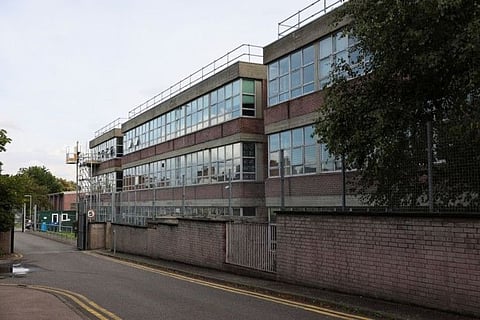104 UK schools ordered to shut buildings over crumbling concrete
Government vows to 'do what it takes' to ensure pupils’ safety

LONDON: The UK government vowed Sunday to “do what it takes” to ensure pupils’ safety, after scores of schools were forced to shut buildings made with an aerated concrete prone to collapse.
As many as 104 schools and colleges containing Reinforced Autoclaved Aerated Concrete (RAAC) have been ordered not to reopen buildings this coming term, in a growing scandal dating back years.
More than 50 other education sites have already been forced to put “mitigations in place” this year due to the presence of RAAC.
The decision drew anger from parents and teachers on the eve of a new term and posing a fresh headache for the government.
Britain’s education system, still recovering from the home-learning impact of the pandemic, has been hit by six months of teachers strikes in 2023, on top of the challenge posed by what schools say is a lack of funding in an inflationary environment.
The impression that vital national infrastructure is crumbling adds to the challenge faced by Prime Minister Rishi Sunak as he heads for a national election expected next year, following industrial action across education, healthcare and transport.
Education minister Gillian Keegan said the majority of schools affected would remain open for face-to-face learning for all pupils because the problematic concrete was only found in a small part of the school buildings.
But some schools will face complete if temporary closure.
“In some cases, it will be the whole school,” schools minister Nick Gibb told Sky News on Friday.
Gibb also said that it could be safe for pupils to work in a classroom with the ceiling propped up by steel girders.
The news that schools will be affected comes just days before most children are due to return to education for the new year after a six-week summer holiday, raising questions over why the government had announced the move at the last minute.
“The DfE and government have squandered valuable months hiding this crisis when they should have been fixing dangerous school buildings,” said Mike Short, head of education at trade union UNISON.
Keegan said safety was the government’s top priority.
“This decision has been made with an abundance of caution,” she said in a statement.
Cheap, lightweight form of concrete
Structural experts have warned it is likely to be found within many other sites, including hospitals, courts and some public housing, and they may also have to close for remedial works.
RAAC - a cheap, lightweight form of concrete - was widely used in parts of building construction across Britain from the 1950s to the mid-1990s, with concerns about its risk of collapse emerging since 2018.
That year the roof of a primary school in Kent, southeast England, collapsed without warning.
“The government will take action immediately when we know there is any kind of risk,” finance minister Jeremy Hunt told Sky News as he faced a barrage of questions about the issue.
“We will do what it takes to make sure that children are safe,” he added, amid a public outcry as millions of pupils return to school from summer holidays.
“We will prioritise spending money to sort out these problems where that needs to happen.”
Hunt said officials had initiated a “huge survey” of every single school in the country to identify where RAAC is in place.
The Sunday Times reported that experts have cautioned that asbestos could be exposed in the schools affected by the crumbling concrete, resulting in many being shut for months.
Meanwhile, the Collaborative Reporting for Safer Structures UK organisation has repeatedly warned in reports that RAAC planks are present in many types of UK buildings.
The “useful life” of such planks has been estimated to be around 30 years, it has noted.
In his round of broadcast interviews, Hunt said the government would act wherever potential structural problems are identified.
“If we receive any information that suggests that, then we will take the action that’s necessary,” he told the BBC.
However, education officials, public sector unions and opposition parties have hit out at the government’s handling of the issue, in particular the short notice given to impacted schools ahead of the new term.
“I am extremely disappointed and frustrated that there was not a plan in place for this happening,” England’s children’s commissioner Rachel De Souza told the BBC.
“There should have been planning in place and a really good school building programme that has addressed this over the years.”
Sign up for the Daily Briefing
Get the latest news and updates straight to your inbox



